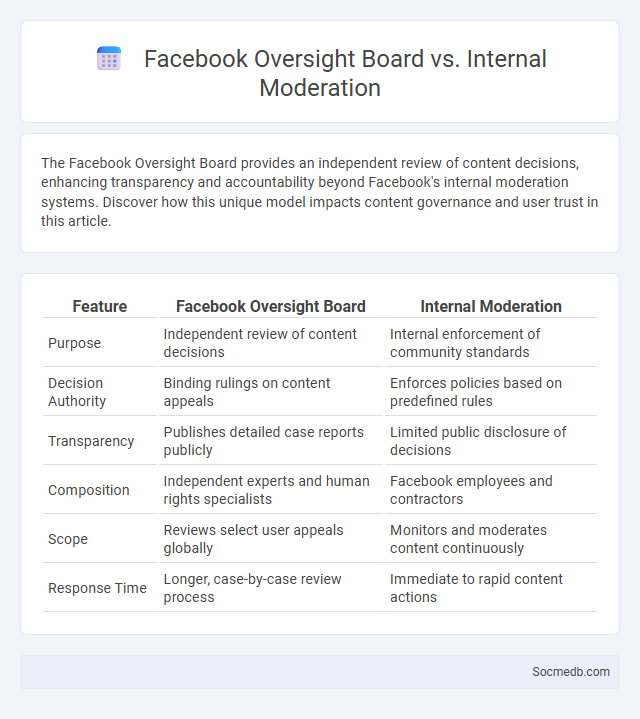
Photo illustration: Facebook Oversight Board vs Internal Moderation
The Facebook Oversight Board provides an independent review of content decisions, enhancing transparency and accountability beyond Facebook's internal moderation systems. Discover how this unique model impacts content governance and user trust in this article.
Table of Comparison
| Feature | Facebook Oversight Board | Internal Moderation |
|---|---|---|
| Purpose | Independent review of content decisions | Internal enforcement of community standards |
| Decision Authority | Binding rulings on content appeals | Enforces policies based on predefined rules |
| Transparency | Publishes detailed case reports publicly | Limited public disclosure of decisions |
| Composition | Independent experts and human rights specialists | Facebook employees and contractors |
| Scope | Reviews select user appeals globally | Monitors and moderates content continuously |
| Response Time | Longer, case-by-case review process | Immediate to rapid content actions |
Overview of Content Moderation Approaches
Content moderation on social media employs automated algorithms, human reviewers, and hybrid systems to filter harmful or inappropriate content efficiently. These approaches balance user safety with free expression by identifying hate speech, misinformation, and spam while adapting to platform-specific policies. Your online experience relies on these moderation techniques to maintain a respectful and safe digital environment.
What Is Internal Moderation on Facebook?
Internal moderation on Facebook refers to the platform's system for monitoring and managing content shared by users to ensure compliance with community standards and policies. Your posts, comments, and interactions are reviewed through a combination of automated algorithms and human moderators who assess reported content for violations such as hate speech, misinformation, or harassment. This process helps maintain a safe and respectful environment for all users while allowing Facebook to swiftly address harmful behavior.
Introducing the Facebook Oversight Board
The Facebook Oversight Board serves as an independent body reviewing content decisions on Facebook and Instagram, ensuring transparent enforcement of community standards. It provides authoritative rulings on complex cases involving misinformation, hate speech, and harmful content, fostering accountability within the platform. Your concerns about content moderation can be escalated to this board for impartial evaluation and potential policy revision.
Key Differences Between Internal Moderation and Oversight Board
Internal moderation involves your organization's team managing content using predefined guidelines to ensure community standards are upheld promptly and consistently. Oversight Boards function independently, reviewing complex or controversial decisions to provide accountability and transparency beyond internal processes. Understanding these distinctions allows you to balance efficient content control with impartial evaluations that protect user rights and platform integrity.
Structure and Process of the Facebook Oversight Board
The Facebook Oversight Board consists of an independent panel of experts tasked with reviewing content moderation decisions made by Facebook and Instagram, ensuring compliance with human rights standards and company policies. Its decision-making process involves evaluating appeals, issuing binding rulings, and providing policy recommendations to enhance transparency and accountability. Structured for impartiality, the board operates separately from Facebook's management, with clear procedures for case selection, deliberation, and publication of decisions to uphold fairness and legitimacy in content governance.
Challenges of Internal Moderation Systems
Internal moderation systems on social media platforms face significant challenges in accurately identifying harmful content due to the nuances of language, cultural differences, and the context-dependent nature of posts. These systems often struggle with high volumes of data, leading to delays and inconsistencies in content review processes. Balancing the enforcement of community guidelines while protecting freedom of expression remains a complex issue for platform moderators and automated tools alike.
Transparency and Accountability in Content Moderation
Transparency and accountability in content moderation are crucial for maintaining user trust and platform integrity. Clear policies, detailed content removal explanations, and consistent enforcement ensure Your online interactions are fair and respectful. Platforms that implement transparent moderation practices empower users to understand decisions and hold moderators accountable.
Impact on User Trust and Platform Integrity
User trust in social media platforms significantly influences their engagement and the platform's overall success. Misinformation, breaches of privacy, and algorithmic bias undermine platform integrity and erode user confidence. To maintain your trust, platforms must implement transparent policies, robust content moderation, and data protection measures.
Appeals Process: Oversight Board vs Internal Moderation
The Appeals Process in social media content review often involves a choice between the Oversight Board and Internal Moderation systems, each serving distinct roles in content governance. The Oversight Board operates independently to review and overturn platform decisions, providing an external layer of accountability and transparency. Your understanding of these mechanisms empowers you to navigate content disputes effectively and engage with platforms' moderation policies more strategically.
The Future of Content Moderation on Facebook
The future of content moderation on Facebook is increasingly leveraging advanced artificial intelligence algorithms to detect and remove harmful content more efficiently. Facebook continues to invest in machine learning models that can identify hate speech, misinformation, and violent imagery with higher accuracy, enhancing user safety across the platform. You can expect continuous improvements in real-time content review processes that balance free expression with community guidelines enforcement.
 socmedb.com
socmedb.com